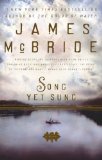Summary | Excerpt | Reading Guide | Reviews | Beyond the Book | Readalikes | Genres & Themes | Author Bio

Critics' Opinion:
Readers' Opinion:
First Published:
Feb 2008, 368 pages
Paperback:
Jan 2009, 384 pages
 Book Reviewed by:
Book Reviewed by:
Lucia Silva
Buy This Book
Excerpt
Song Yet Sung
On a grey morning in March 1850, a colored slave named Liz Spocott dreamed of the future. And it was not pleasant.
She dreamed of Negroes driving horseless carriages on shiny rubber wheels with music booming throughout, and fat black children who smoked odd-smelling cigars and walked around with pistols in their pockets and murder in their eyes. She dreamed of Negro women appearing as flickering images in powerfully lighted boxes that could be seen in sitting rooms far distant, and colored men dressed in garish costumes like children, playing odd sporting games and bragging like drunkards—every bit of pride, decency, and morality squeezed clean out of them.
Liz had this dream in captivity, just as the flickering light of her own life was disappearing, and when she awoke from it realized with a gasp that it was some kind of apparition and she had to find its true meaning in this world before she died. This brought her more grief than her condition at the time, which was not pleasant, in that she’d been lying for three weeks, badly wounded, imprisoned in an attic on Maryland’s eastern shore.
She had taken a musket ball to the head at Ewells Creek, just west of New Market. It was five a.m. when she was hit, running full stride on a brisk March morning behind three other slave women who had made a desperate dash for freedom after two days of keeping a hairsbreadth from two determined slave catchers who had chased them, ragged and exhausted, in a zigzag pattern through the foggy swamps and marshland that ran from Bishops Head Island up through Dorchester County. They were nearly caught twice, the last by inches, the four saved by a white farmer’s wife who warned them at the last minute that a party with horses, dogs, and rifles awaited them nearby. They had thanked the woman profusely and then, inexplicably, she demanded a dime. They could not produce one, and she screamed at them, the noise attracting the slave catchers, who charged the front of the house while the women leaped out the back windows and sprinted for Ewells Creek.
Liz never even heard the shot, just felt a rush of air around her face, then felt the cool waters of the creek surrounding her and working their way down her throat. She tried to rise, could not, and was hastily dragged to shallow water by the other women, who took one look at the blood gushing out near her temple and said, Good-bye, chile, you free now. They gently laid her head on the bank of the muddy creek and ran on, the sound of barking dogs and splashing feet echoing into the empty forest, the treetops of which she could just make out as the fog lifted its hand over the dripping swamp and the sun began its long journey over the Maryland sky.
Not two minutes later the first dog arrived.
He was a small white and brown mongrel who ran up howling, his tail stiff, and ran right past her, then glanced at her and skidded to a stop, as if he’d stumbled upon her by accident. If Liz weren’t shot and panicked, she would have remembered to laugh, but as it was, sitting in water up to her waist, she felt her face folding into the blank expression of nothingness she had spent the better part of her nineteen years shaping; that timeworn, empty Negro expression she had perfected over the years whereby everything, especially laughter, was halted and checked, double-checked for leaks, triple-checked for quality control, all haughtiness, arrogance, independence, sexuality excised, stamped out, and vanquished so that no human emotion could emerge. A closed face is how you survive, her uncle Hewitt told her. The heart can heal, but a closed face is a shield, he’d said. But he’d died badly too. Besides, what was the point? She was caught.
Excerpted from Song yet Sung by Charles Frazier Copyright © 2008 by James McBride. Excerpted by permission of Riverhead Books, a division of Pengion Group, Inc. All rights reserved. No part of this excerpt may be reproduced or reprinted without permission in writing from the publisher.





The Funeral Cryer by Wenyan Lu
Debut novelist Wenyan Lu brings us this witty yet profound story about one woman's midlife reawakening in contemporary rural China.
Your guide toexceptional books
BookBrowse seeks out and recommends the best in contemporary fiction and nonfiction—books that not only engage and entertain but also deepen our understanding of ourselves and the world around us.